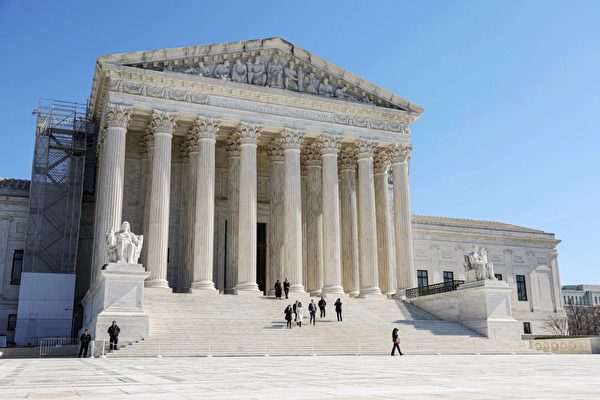On Monday, the Supreme Court of the United States discussed whether cities should be allowed to enforce laws restricting homeless individuals from sleeping or camping in public places. The Justices seemed inclined to support cities in cracking down on homeless encampments, as they raised questions about the rulings of lower courts. Lower courts have deemed laws limiting homeless individuals from camping in public places as a violation of the Constitution’s prohibition against cruel and unusual punishment.
Homelessness has been a longstanding issue in major cities across the United States, and the Supreme Court’s decision will have a significant impact on law enforcement nationwide. Local governments are hoping to have more flexibility in addressing this increasingly serious social problem.
The case in question is Grants Pass v. Johnson, with plaintiffs being civil rights organizations and some homeless individuals, and the defendant being the town of Grants Pass, Oregon.
Despite a population of only 40,000 residents, Grants Pass has been facing escalating issues related to homelessness. This lawsuit has gained national attention, with a decision expected from the Supreme Court before July.
In Grants Pass, homeless encampments are visible in parks, disrupting events like concerts and family gatherings. Homeless individuals leave behind significant amounts of trash, hang clothes on trees, and leave used drug needles on the ground, all in close proximity to children’s playgrounds. Additionally, a fatal shooting incident occurred in a park in 2023. These ongoing problems have left local residents frustrated and dissatisfied.
The town council has been issuing citations to homeless individuals since 2013 under strict anti-camping laws. Over a five-year period from 2013 to 2018, the town issued 500 citations, each with a fine of $250.
Subsequently, civil rights organizations and some homeless individuals took the town to court, alleging that these actions were unlawful. They argued that homelessness stemmed from governmental incompetence, and now the government was passing the blame onto vulnerable individuals.
The case escalated to the Ninth Circuit Court of Appeals. In 2018, the Ninth Circuit ruled that while local governments can prohibit camping in public spaces, they cannot impose criminal penalties, as it would violate the Eighth Amendment of the Constitution by cruelly punishing those without homes.
By 2022, the appellate court had broadened its scope on related cases, suggesting that issuing fines to homeless individuals might also be unconstitutional. The court pointed out that the Eighth Amendment prohibits the government from punishing based on a person’s status rather than their actions, and therefore issued an injunction restricting cities from enforcing such ordinances.
The case eventually reached the Supreme Court.
On Monday, a majority of conservative Justices expressed that the Ninth Circuit’s actions infringed upon local officials’ discretion in governing communities.
Chief Justice John Roberts stated that aiding the homeless is both difficult and costly, and that “cities all have competing priorities.”
For example, he questioned how to prioritize between building shelters, addressing lead-contaminated water pipes, and even inadequate fire safety measures, highlighting the complexities involved.
According to the federal government, more than 650,000 individuals are homeless on any given night across America, the highest figure since federal officials began tracking homeless populations in 2007.
This case has garnered attention from officials of both political parties, including California Governor Gavin Newsom and 22 Republican governors, who believe that the Ninth Circuit’s ruling limits local governments’ ability to address homeless issues.
However, liberal Justices argued that Grants Pass specifically targeted homeless individuals in enforcing anti-camping laws.
Justice Sonia Sotomayor pointed out during government lawyers’ testimonies, saying, “You’re only arresting people who don’t have homes.”
When the government lawyers responded that the law applied to everyone, Sotomayor argued that there was no record of anyone besides homeless individuals facing enforcement actions before the court issued an injunction.
Homeless advocate Kelsi Corkran stated that cities were expanding enforcement of laws targeting homeless categories. “If there’s a law saying homeless individuals can’t urinate or defecate anywhere within city limits, then the situation starts resembling this case,” he remarked.
In Grants Pass, there is a homeless shelter that can accommodate up to 138 people. The shelter, operated by a Christian group, imposes regulations prohibiting smoking, drinking, drug use, and pet ownership, which has deterred many homeless individuals from seeking help.
Additionally, local residents volunteer to assist homeless individuals by providing food, medicine, and essential supplies to those in need, and arrange relocations to comply with government regulations.
The Biden administration is seeking a middle ground on the homeless issue. It argues that Grants Pass’ law criminalizing homelessness is unconstitutional, but the Ninth Circuit’s restrictions on local governments are overly stringent.
The appeals court’s decision is based on a Supreme Court ruling from 1962. The ruling stated that individuals can be arrested for using illegal drugs (an action), but not for being addicted to drugs (a status).
The Ninth Circuit argued that if someone becomes homeless “involuntarily” due to a lack of shelter beds, then camping bans target their status, not their behavior, violating the Eighth Amendment.
Justice Neil Gorsuch questioned the distinction between status and behavior as being “elusive” and often closely intertwined.
Roberts also raised doubts, asking whether a homeless individual can instantly lose their status if they move to a shelter or something else happens, or conversely, gain homeless status if evicted from a shelter or facing other circumstances.
Justice Amy Coney Barrett noted that differentiating between homelessness and unavoidable actions (such as sleeping in public places) is not straightforward. “How do we draw these difficult lines when it comes to public urination?” she inquired.

